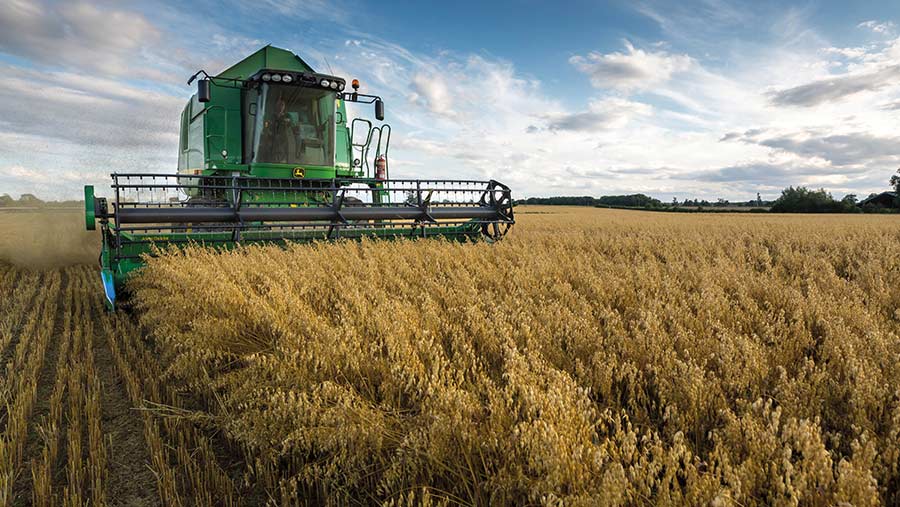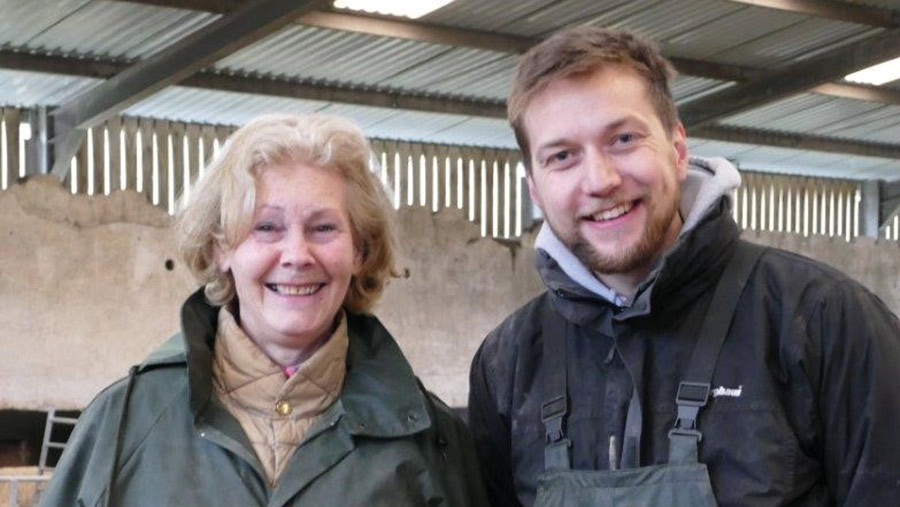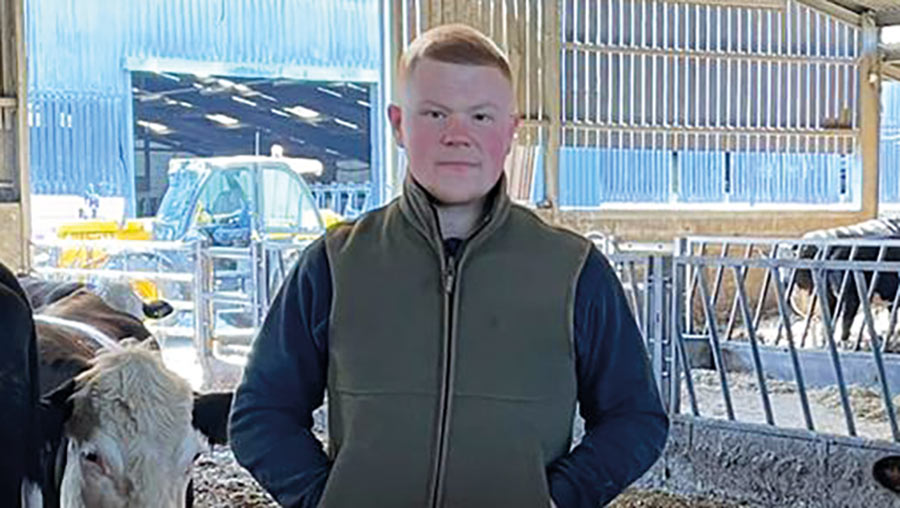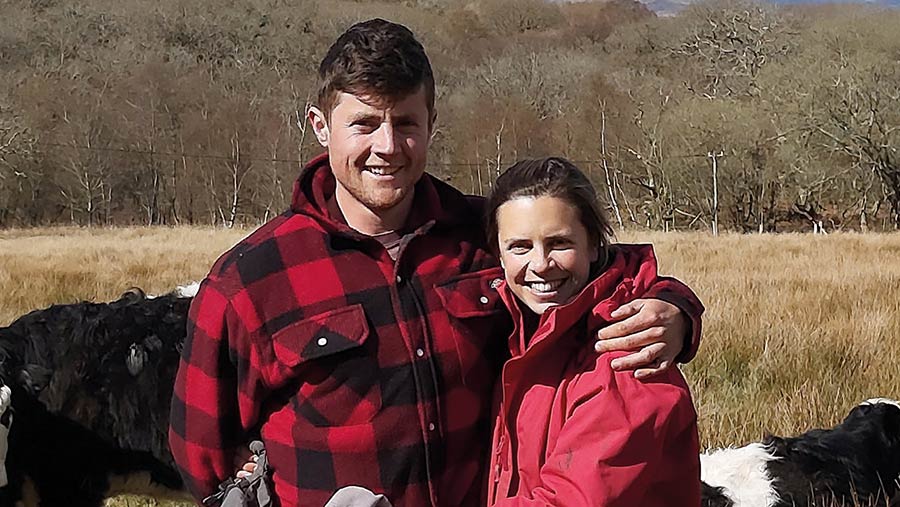How these young farmers got their farming jobs
 © Tim Scrivener
© Tim Scrivener Farming can be a difficult industry for young farmers to get their foot on the ladder but perseverance can pay off.
We find out how four young farmers found their route into farming jobs.
See also: Visit the Farmers Weekly Learning Centre for continuous professional development
Lawrence Martin: Tenancy agreement
Nearly five years since Daye Tucker answered an eager new entrant’s social media plea for work experience, a tenancy agreement has been finalised with Lawrence Martin.
He will officially farm in his own right on Mrs Tucker’s 160ha farm, nestled in the Endrick Valley, near Balfron in Scotland.
Mr Martin, 31, always knew he wanted to farm, so set about gaining as much experience as he could while completing his higher national certificate in agriculture, followed by a modern apprenticeship on Carbeth Home Farm, Balfron.

Daye Tucker with Lawrence Martin © Lantra
This earned him a wage and an industry-recognised qualification, while Mrs Tucker, 75, passed on her knowledge and trained up a potential successor.
Lambs from the farm’s flock of Lleyn sheep are sold directly to Scotbeef and into Marks & Spencer. “He brought what he had learned from the college, which was quite considerable, and it has just got better and better,” says Mrs Tucker.
“He is involved in everything we do – we make all the decisions jointly. I have completely opened my books, and he helps me with the Sage accounting,” she adds.
Since quitting his job at Sky to work on the farm full-time, Mr Martin has never looked back. He is a Lantra industry champion, speaking to and inspiring young people interested in a farming career.
He plans to buy some Belted Galloway cattle and will continue to help run the sheep enterprise.
“There isn’t any lack of enthusiasm or demand for people in my position,” he says.
“The real advice needs to come from the older generation of farmers, who need to give people that opportunity to try to share their knowledge and experience, to pass it on to someone.”
Billy Smith: Sheep enterprise
Billy Smith has made a successful start to running his own enterprise on the family farm in Ewhurst, Surrey.
The 18-year-old has been working with his brothers, Charlie and Toby, and dad, Vinny, on the 200ha third-generation beef farm since finishing a bricklaying apprenticeship.
Keen to help the family business, he decided to buy 83 in-lamb Suffolk cross Mule ewes with his own money.
With more than 150 lambs born, Billy is already planning to expand next year by investing in some more ewes. This year’s lambs will be fattened and sent to market.

Billy Smith © Jo Cooper
“I think it has gone really well and we have managed to get over any problems we had. It has been hard work, but very rewarding,” he says.
“Dad and I have worked out which fields we can use to graze the sheep without affecting the cattle and maize.”
Vinny’s partner, Jo, has been impressed by Billy’s dedication and hard work. “He has done the night duties and pretty much all the lambing, having never done that before.”
Billy says help from Chloe Donovan, from Westpoint Farm Vets, has been invaluable.
“It’s so pleasing to see a young farmer getting stuck in and diversifying the family business,” Ms Donovan says.
“I’ve been really impressed with Billy’s dedication and hard work over lambing. They managed to build a good, healthy foundation flock, and lambing has gone really well.
“We’ve done a couple of caesareans where it’s been the best choice for the ewe and her lambs, and they’re happy out in the field now. I really think Billy has an exciting future in sheep farming ahead of him and I’m looking forward to seeing the flock grow.”
Teleri Fielden and Ned Feesey: National Trust tenancy
Despite having no agricultural background, Teleri Fielden and her partner, Ned Feesey, have realised their farming dream, being six months into a 10-year National Trust farm business tenancy at Hafod y Llyn Isaf, in Snowdonia National Park.
The current focus is on improving the infrastructure and grassland on the 44ha farm, as they slowly build up sheep and cattle numbers.
There are 70 ewes, which are Welsh Mountain and Romney breeds, and 13 cattle that are a mix of Welsh Black, Belted Galloway, Hereford, Dexter and Whitebred Shorthorn.
A further 40ha of hill ground and woodland is rented for grazing.

Teleri Fielden and Ned Feesey © Teleri Fielden
Ms Fielden says she has always wanted to farm, so she volunteered and worked on neighbours’ farms growing up.
She spent time in France as part of the Worldwide Opportunities on Organic Farms programme.
A scholarship with the National Trust and Wales Young Farmers’ Club then gave Ms Fielden further important practical experience, running a large upland farm, also in Snowdonia.
It is a busy life for the farming couple. Ms Fielden also works as a policy officer for the Farmers’ Union of Wales (FUW), and Mr Feesey is a Snowdonia footpath ranger at the National Trust.
“For me, it has been important to get the practical experience, but the main thing is finding mentors and to be willing to ask for help,” Ms Fielden says.
“Once you show you are really keen and willing to put the hours in, I think people are more than willing to give their time and experience.”
This proactive attitude helped secure the coveted tenancy on the farm in Nantmor.
“We got involved with the Tenant Farmers Association and FUW, so I think it is about using as many contacts as you can and always asking for help.”
Scottish Land Matching Service
Gaining farming experience and qualifications, and securing land and finance can be a daunting prospect, but organisations such as Lantra and the Scottish Land Matching Service (SLMS) are helping the next generation of farmers.
“I am in my fifth year with Lantra and there are more young people now who are interested in finding out about agriculture than ever before,” says Sheena Howden, project manager at training and development outfit Lantra Scotland.
“People are more aware of what the industry is looking at for the future – the skills that are going to be needed for the transition to net zero. Young people are a lot more knowledgeable about that than they ever have been.”
Gaining academic and practical experience is a crucial first step for anyone starting out, but it must be combined with the character traits a life in farming demands.
“The key one is resilience. You will have to deal with lots of challenges and external influences. Be flexible and adaptive, enterprising and a good communicator.
“Be inquisitive – somebody who wants to find out things and is always learning, because agriculture is moving at such a rate,” Ms Howden says.
Rather than training, the SLMS looks to pair up older farmers with young new entrants who have already gained some experience and qualifications – and interest in the service is soaring, says independent adviser Allan Young.
“The number of people coming forward is four or five for each opportunity being offered,” he says.
“We are trying to promote the idea that farmers could make life easier for themselves if they had some young blood to help out, and for them to mentor and help that person onto the farming ladder.”
This doesn’t have to be a long-term commitment, he adds, but something that allows the young farmer a stake in that business and helps them build capital.
Mr Young says a large number of the young people who contact the service are motivated by the issues facing the industry, such as climate change mitigation and sustainability solutions like regenerative agriculture.
See the Scottish Land Matching Service website and Lantra for more information.
Award-winning advice to start out
“Learn about your prospective customers – who do you see buying your produce?
Ask yourself how much they are going to pay you and work out as accurately as possible what your costs of production will be. Be realistic and honest with yourself.
Does it stack up? Having a plan for your route to market is important to maximise returns and ensure what you produce is what the market really wants. Strive to make it to the exacting standards they expect.”
Peter Eccles, 2020 Farmers Weekly Farmer of the Year
“Communicate with customers, family, staff, bank, financial adviser and friends. It is important you do not bury your head in the sand when things get rough. There are people out there to help, just ask.
Ensure you have a sanctuary to go to – there will be times when things don’t go to plan. Talk, get away from it, reset and start again. Believe in yourself. You will make mistakes, but learn from them.”
Andrew Robinson, 2019 Farmers Weekly Farmer of the Year
